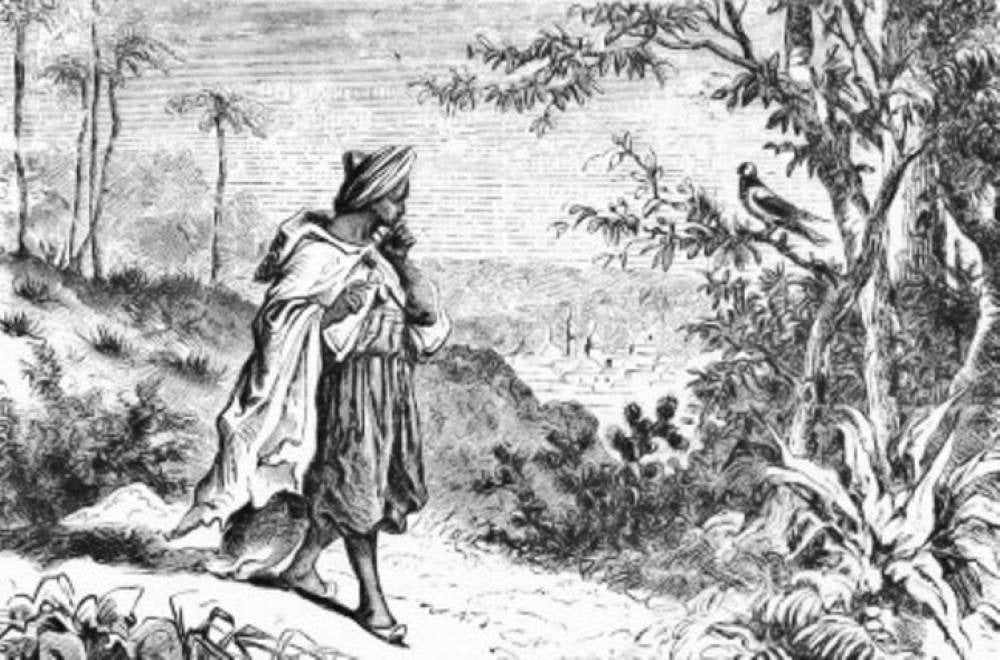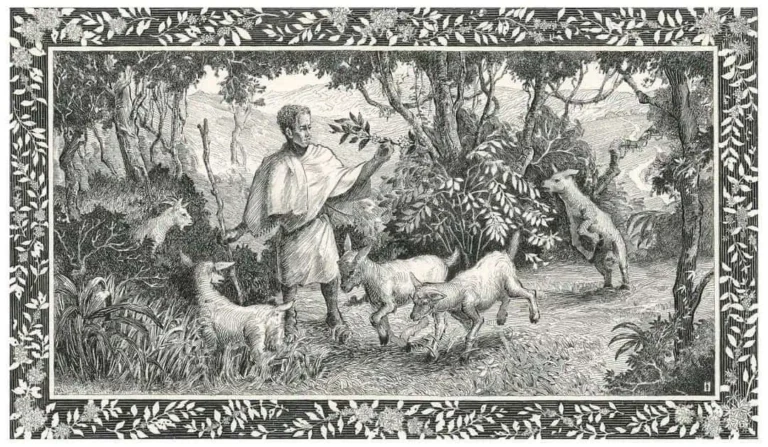Coffee Originated in Ethiopia
Coffee’s history starts in Ethiopia’s highlands, known as its birthplace. Specifically, legend has it that around 800 AD, a curious goat herder named Kaldi stumbled upon a peculiar phenomenon.
Notably, his goats exhibited extraordinary energy after consuming berries from a certain tree. Intrigued, Kaldi sampled the berries himself, experiencing newfound alertness and vigor. Consequently, recognizing the significance of his discovery, Kaldi shared the berries with local monks.
The Monks’ Misjudgment and Revelation
The monks didn’t believe in the energizing effects of the berries at first. They believed the berries were of demonic origin.. As a result, they threw the berries into the fire. The roasting berries emitted an enticing aroma, surprising them.
Realizing their hasty judgment, the monks salvaged the charred berries and brewed them in hot water. Consequently, as they drank this new brew, they were amazed by its energizing effects, which helped them pray for longer periods. Thus began the legend of coffee originated in Ethiopia.
Spreading Eastward: Yemen’s Role in Coffee’s Journey
Stories of energizing berries spread across continents, leading coffee to the Arabian Peninsula and beginning a remarkable journey. In particular, Yemen played a pivotal role in shaping the history of coffee.
According to Yemeni legend, a Sufi priest in Ethiopia discovered energizing berries that birds were eating. This discovery eventually led to the creation of coffee. Tired from traveling, he tried the berries and felt a burst of energy like the birds, probably because of the caffeine in the cherries.
Many people believe that coffee beans were originally sent from Ethiopia to Yemen. The exact origins of this event are not clear. Yemeni merchants subsequently cultivated coffee plants on their home soil. Promoting the widespread growth of coffee cultivation and trade began on the Arabian Peninsula.

The Interweaving of Cultures: Yemen’s Coffee Legacy
Yemen has a unique coffee culture with strong traditions and symbolism. This culture has had a significant influence on the history of coffee. In Yemen, the local beverage called “qahwa” is important for socializing and bringing people together in a unique style.
Caffeine in coffee makes people more alert and talkative at gatherings. This leads to interesting conversations and connections.
In Yemen, coffee is a big part of daily life, from special ceremonies to unique brewing methods. As merchants traded coffee along old trade routes, the drink crossed borders and became popular with people all over. (Wagner, 2005)
Charting the History of Coffee Timeline
The history of coffee is a fascinating story of innovation, discovery, and cultural exchange narrated in sequential order. Coffee has a rich history, starting in Ethiopia and spreading worldwide. Moreover, the timeline of coffee’s evolution is punctuated by key milestones, each contributing to its enduring legacy:
- 9th Century AD: Kaldi encounter with energizing berries in Ethiopia lays the foundation for coffee’s discovery.
- 15th Century AD: Coffee cultivation spread to Yemen, where it spread worldwide.
- 16th Century AD: Coffee house as “qahveh khaneh,” emerge in the Middle East.
- In the 17th century, coffee became popular in Europe thanks to Dutch traders. Coffee houses became important places for culture and business, like a public meeting spot.
- 18th Century AD: The rise of coffee plantations in the New World, make coffee into a global commodity.
- In the 20th century, instant coffee and espresso machines changed how we drink coffee and helped the coffee industry grow.
Beyond Legend: The Oromo People and Coffee Culture
Folklore claims that Kaldi or mythical figures found coffee. However, the true history of coffee originates from the Oromo people of Ethiopia. The nomad from the Wallaga region has been growing coffee for many years. They use the coffee in their cultural traditions and ceremonies.
Recent studies indicate that coffee holds greater significance for the Oromo people than just being a drink. It symbolizes kindness, unity, and community for them. Consequently, their intimate connection with coffee exemplifies the intrinsic link between culture and cultivation, ultimately shaping the trajectory of the global coffee industry. The science behind coffee bean cultivation further evidences this.
Tracing Coffee’s Global Impact
The story of coffee is not just about growing and drinking it, but also shows how a simple bean can change things. Coffee’s popularity led to changes in societies globally, impacting social, economic, and cultural aspects across continents.
From old coffee houses to modern cafes, coffee has brought people together, sparked ideas, and helped society move forward. The journey of coffee starts in Ethiopia and travels to all corners of the world. This journey shows human creativity, strength, and the need for connection and excitement.
The exhibition travels from Ethiopia to different locations around the world. It showcases human creativity, persistence, and the universal desire for connection and excitement.
Coffee’s Influence on Society and Economy
Coffee is not just culturally important, it has also had a big impact on economies and trade networks worldwide. The establishment of coffee plantations in areas like Brazil, Colombia, and Vietnam has driven economic expansion and reshaped environments, even influencing former European colonies. Moreover, coffee production has provided livelihoods for millions of farmers, enriching communities and fostering sustainable development initiatives.
The coffee industry is changing to meet consumer demands, with fair trade and organic farming becoming more popular. Consumer feedback, market demands, and technological advancements drive this constant evolution. In recent years, there has been an increase in demand for specialty drink blends and single-origin beans. This has led to a greater appreciation for the unique flavors and aromas of coffee from various regions.
The Evolution of Coffee Culture
The story of coffee changes over time as people’s preferences, technology, and society change. Coffee lovers have found many ways to enjoy their favorite drinks, from traditional brewing methods to new gadgets. So, this change shows how coffee culture keeps innovating and adapting.
Furthermore, each new development adds another layer to the rich and diverse narrative of coffee’s journey through time. Moreover, the rise of specialty coffee houses and artisanal roasters has elevated the coffee experience, emphasizing quality, stability, and craftsmanship. As coffee culture continues to evolve, it remains a vibrant and ever-evolving tapestry of tradition and art.
Conclusion
People all over the world have loved coffee for many years due to its long history. Coffee originated in Ethiopia and has spread globally, becoming a popular drink worldwide. Furthermore, it has united diverse cultures in a shared appreciation for smells good and makes you feel awake.
As we drink, let’s savor the taste and consider the creativity and connections behind each cup. Each gulp we consume is a testament to human creativity and connections.
Let’s take a moment to acknowledge and appreciate the effort and thought that goes into making our drink. We honor the past with every cup of coffee. We also look forward to the endless opportunities in the ever-changing world of coffee.
Farmers grow coffee at different altitudes, from sea level to over 2,000 meters. Farmers harvest coffee by hand to pick only ripe cherries, ensuring high-quality coffee. This process is important for the final product’s quality.





